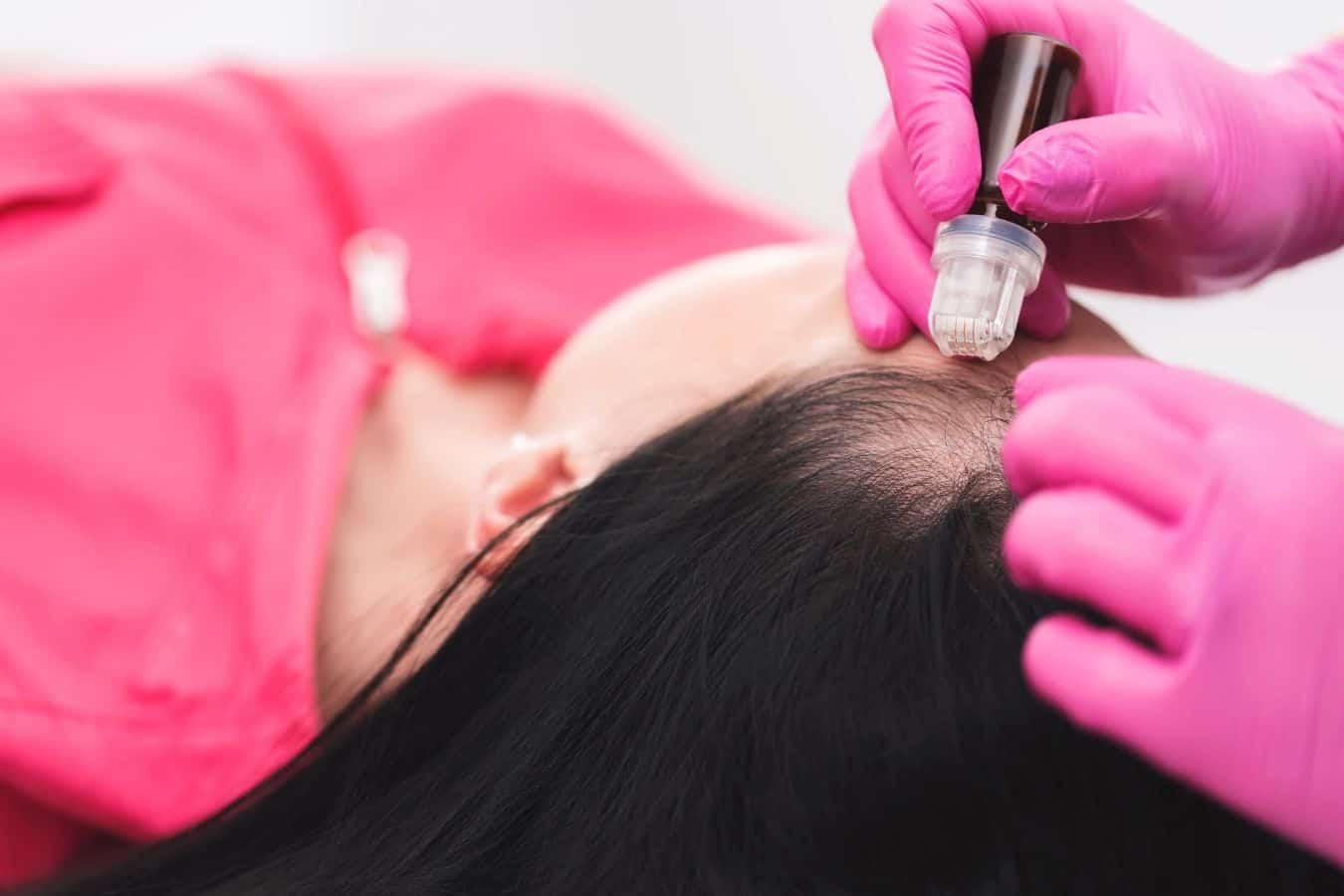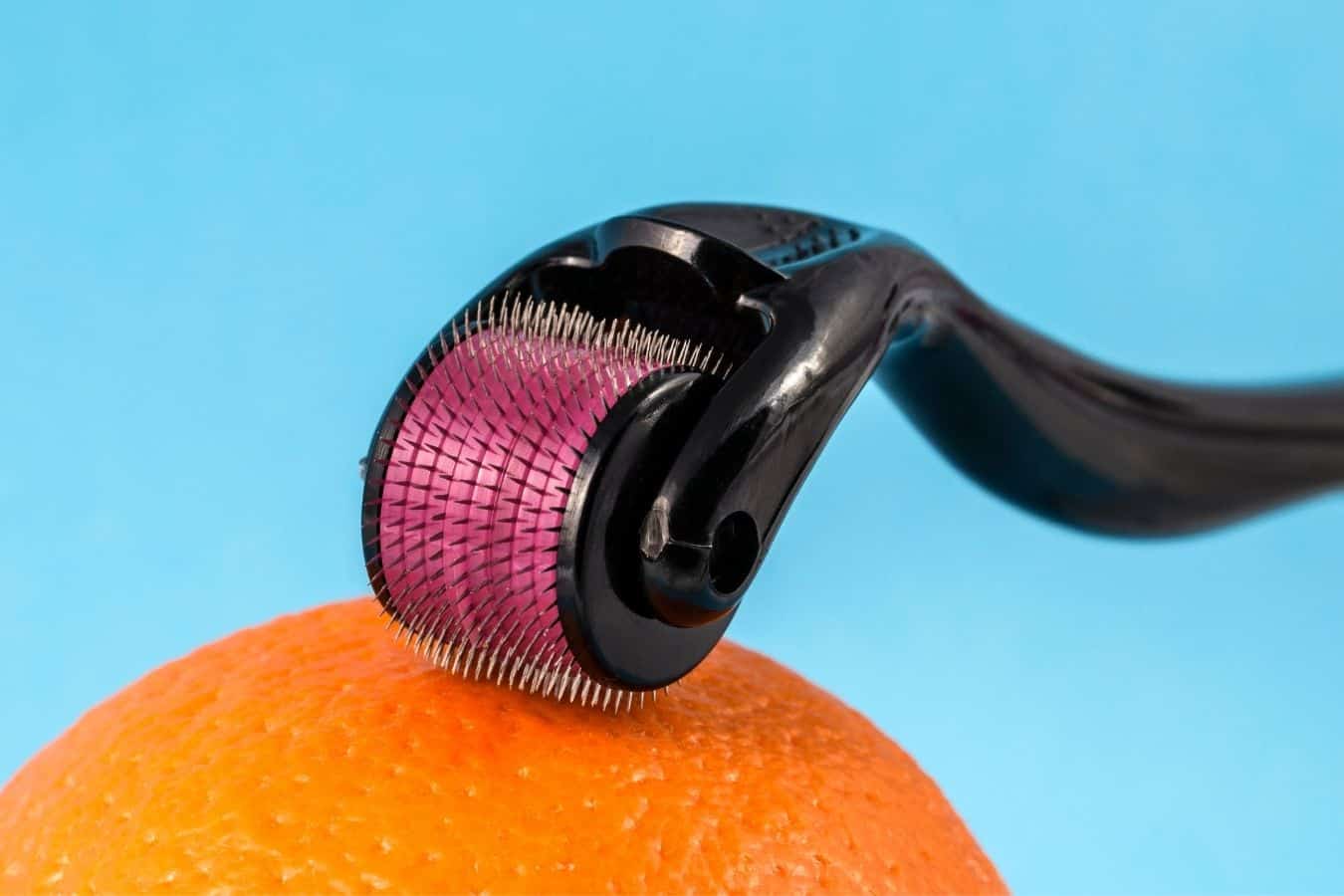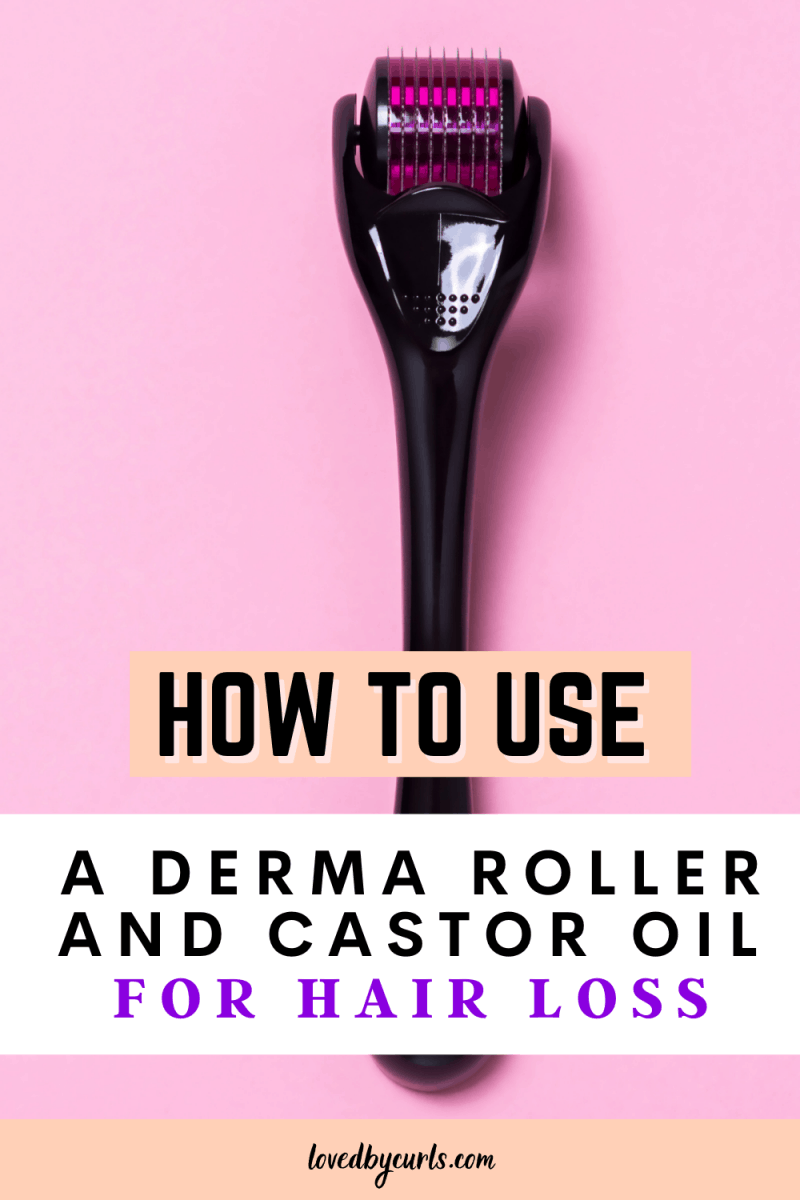Research suggests that using a derma roller and castor oil can help minimize hair loss and contribute to overall hair growth. In this article, we investigate the claims and reveal all the facts.

This post contains affiliate links and we may earn if you click on them (at no extra cost to you). Please read our full disclosure policy here.
You’ve possibly already heard about the benefits of derma rolling for your skin. Derma rolling is often used to aid the appearance of stretch marks, acne scarring, fine lines, and skin dullness.
But increasing evidence and research show that using a derma roller on your scalp can also help mitigate hair loss.
It does this by causing minor injuries to the surface of your head, which then encourages the body to produce extra collagen in order to heal.
In turn, this stimulates the generation of hair by encouraging the hair follicles to similarly react.
But how do you use a derma roller and castor oil for hair loss? We’ve got you covered.
We will take you through how to safely and effectively use a derma roller for hair loss, as well as recommending the best castor oil to use.
What Is A Derma Roller?
Before we tell you how to use a derma roller and castor oil for hair loss, it’s important to understand what a derma roller really is.
Basically, a derma roller is a small handheld device with a rolling cylinder covered in small needles known as microneedles.
These needles vary in length – but if you’re looking for a personal derma roller to use at home, it’s best to shop for one with needles between 0.25mm and 0.50mm.
Microneedles can be significantly longer, but it’s best to leave these to the professionals.
You’re okay to go up to 1mm microneedles, but it might take time to build up to this as your scalp adjusts.
A derma roller with smaller needles – more like 0.25mm – are better for use with castor oil, as these will only penetrate the epidermis layer of the skin.
This derma roller from Sdara Skincare is perfect for anyone starting out.
If you’re looking for a derma roller for both hair and skin, check out Broobest’s 6-1 derma roller kit. This comes with four different needles sizes 1.5, 1, 0.5, and 0.25mm.
Because of the way that derma rollers work to stimulate collagen production in the scalp, you do inflict a minor injury on your skin.
More on this later – don’t worry, these microtraumas are not damaging – but if you use smaller needles, you’re less likely to cause skin redness or discomfort without minimizing the efficacy of the derma roller.
Traditionally, derma rollers have been used for skin conditions, as they work to reduce fine lines or acne scarring.
However, researchers have turned more recently to look at the effect derma rolling has on hair loss, and have found that using a derma roller and castor oil (keep reading for more on that) can significantly help with hair loss.
Also Read: Can Oil Build Up In Natural Hair? (Easy Ways To Tell)
How Does A Derma Roller Work?

Dermarolling or micro-needling essentially works by inflicting minor injuries or microtraumas to the surface of your skin.
If you’re using a derma roller for hair loss, this will be the skin on your scalp. Causing these micro-wounds and inflammation triggers the body’s natural response to heal and repair itself.
To do this, your body produces collagen, which is the main protein of which both your skin and the lining of the hair follicle sack are made.
Collagen makes up 25 – 35% of your body’s protein content. Made up of tightly wound amino acids, it’s vital to the normal function of both your skin and your hair.
Collagen is found in the bulb of the hair follicle – it’s for this reason that it’s critical to hair growth and thickening.
By using a derma roller to stimulate collagen production, you’re ensuring that your hair follicles are well supported with the protein that they need in order to grow.
And don’t worry, contrary to some belief that additional collagen can cause hair loss is not true. In any case, that belief relates to collagen supplements and not naturally stimulated collagen.
Using a derma roller also contributes to increased cell production and blood circulation around the scalp.
Dermarolling causes minor punctures in the layer of your skin called the epidermis. In order to heal, your body reacts by sending more blood to this skin layer.
More blood means more nutrients, so your hair follicles and shafts are better supported in their growth.
The use of a derma roller and castor oil also increases the production of stem cells in the hair follicle, better supporting the growth potential of that follicle.
By ensuring cell turnover, stimulating blood flow, and increasing collagen production, derma rolling helps nutrients, hydration, and sunlight better reach your scalp. Soon, you’ll be saying hello to healthy, growing hair.
Also Read: Can Betaine Help With Hair Loss? (4 Proven Ways)
Why Should You Use Castor Oil With A Dermaroller For Hair Loss?
So we’ve covered why to use a derma roller for hair loss, but how come it’s equally important to include castor oil in this routine?
Well, as discussed, when you derma roll, you’re creating micro-injuries in your scalp surface in order to stimulate collagen production.
After derma rolling, your skin barrier is, therefore, more porous. By using oil after derma rolling, you’re therefore flooding your skin with nutrients.
In fact, oiling after derma rolling means you’ll absorb around 80% of the oil’s nutrients, compared to only 7 – 10% without a derma roll.
There’s scientific data to back this up, too. This study found that in the participants who used oil after derma rolling, there was significantly better, more robust hair growth.
Castor oil has been a solution for hair growth for thousands of years. It contains ricinoleic acid and omega acids, thereby improving blood flow to the scalp and antioxidants that enable hair growth and strengthening.
Castor oil also works great for protein-sensitive hair. If there is too much protein in your hair, it can be come stiff, crunchy and dry.
Other oils great for hair include soybean oil as well as hazelnut oil which is a penetrating oil.
How To Use A Dermaroller And Castor Oil To Prevent Hair Loss
Before we tell you how to best use a derma roller and castor oil for hair loss, be aware that you will be causing mild irritation to your scalp.
Be conscious of therefore using products with minimal chemicals or added fragrance – especially if you have a sensitive scalp.
Test them out on a small patch before applying to a large area – you can use the inside of your elbow – and practice derma rolling to gauge the reaction of your scalp.
Otherwise, follow these steps in order to effectively use a dermaroller and castor oil to reduce hair loss:
Using A Derma Roller And Castor Oil For Hair Loss:
Step 1
Comb your hair in advance and ensure it’s dry. Place the derma roller at your hairline’s edge, or the area over which you’re keen to encourage hair growth.
For readers with long hair, part it in sections. If you have androgenic alopecia, perhaps make a middle parting and then split your hair from there.
Step 2
It’s oil time! Massage a few drops of oil – we recommend castor oil – or an alternative topical onto your hair. Don’t ever put the oil on the derma roller itself.
Roll the device across your hair, horizontally, vertically, and diagonally. Repeat this rolling around 4 – 5 times over each area on which you’re focusing.
You want to be moving in the direction of hair growth so as not to pull hairs out. Apply enough pressure to stimulate and penetrate the scalp – it should feel prickly or tingly but not painful.
If you’re concerned about sensitivity, roll the device on the back of your hand first, in order to gauge your threshold. A medium to light pressure should work.
Step 3
Once you’re done with rolling, add a few more drops of oil or topicals if you’re keen to really top up your hair’s nutrients. You can leave the oil in your hair overnight in order to help hair growth.
After having derma rolled, stay away from irritating substances. That means no exfoliating scrubs or apple cider vinegar rinses.
It also means staying away from over-scented products, glycolic acid, or alpha hydroxy acids. Leave your hair for 24 hours before styling or coloring it, too.
In Order To Avoid Infection Or Injury:
It’s really important to ensure that your derma roller is sanitized after each use!
Either rinse the cylindrical head of your derma roller with hot, soapy water and spray with a 70% alcohol sanitizing solution or use only alcohol solution in order to disinfect.
Allow the derma roller to dry and pop it back in its case. If your derma roller gets damaged in any way, get rid of it – you don’t want to cause yourself injury.
Replace your derma roller every two months.
Also Read: Can You Use Oil As A Detangler? A Helpful Guide
How Often To Use A Derma Roller For Hair Loss?
It’s difficult to give a one-size-fits-all answer to the question of how frequently to use a dermaroller for hair loss.
It really depends both on the length of the device’s needles and your own skin’s sensitivity. You definitely shouldn’t be using it every day.
When you first start dermarolling, plan to do so every 1 – 2 weeks. Be aware that your scalp area needs to have fully healed before you commence your next treatment.
If skin appears a bit red or sore after micro-needling, this is normal – in fact, it means it’s working.
You can help the healing process by keeping the area clean and wearing a hat after treatment.
Once your scalp becomes used to derma rolling, do so twice a week in order to maximize hair growth.
Aim for around 10 minutes per session. You’ll need to commit to derma rolling in order to see any reduction in hair loss.
The Best Oils To Use With A Dermaroller For Hair Loss
These are the best oils that we recommend for you to use with your dermaroller in order to mitigate hair loss.
Castor oil is our preference, but broadly speaking you want to be keeping to the following rules:
- Cold-pressed oils are best. They’re less acidic, so you’re less likely to experience a pH imbalance in your scalp.
- DHT blocking oils help to balance out excess DHT, a hormone with significant links to hair loss. These oils include rosemary oil, tea tree oil, and lavender oil. Peppermint oil is also great – but it’s likely to tingle on first application.
- Argan oil is also great, as are ayurvedic oils like amla oil, Brahmi oil and Bhringraj oil.
Pukka Herbs Organic Cold Pressed Castor Oil
Anything Pukka Herbs is great by us. Sustainably sourced and organic, this castor oil is premium quality and ideal for nourishing and hydrating dry locks and maximizing hair growth.
It’s vegetarian and vegan friendly, and GMO-free – plus you can either reuse or recycle the glass bottle once it’s used up.
Bionoble Organic Castor Oil
Another vegan and cruelty-free castor oil. This also comes with a pipette and pump to make application easier.
The oil is cold-pressed in India, and ideal for using on your hair – but you can also add it to eyelashes, eyebrows, brittle nails, and stretch marks too.
Jamaican Mango & Lime Castor Oil
This castor oil from Jamaican Mango has both coconut and castor oil in it – both are great for hair growth and thickening.
The smell is divine and it will work as well on skin conditions like eczema and psoriasis.
Gya Labs Tea Tree Essential Oil
Be sure to test this on a small patch of scalp before applying to the whole area, so as to check your tolerance levels.
But this essential oil is really clarifying and smells divine, helping your hair to maximize its growth.

Disclaimer: This site is not intended to provide professional or medical advice. All of the content on LovedByCurls.com is for informational purposes only. All advice should be followed at your own discretion. Ingredients may change at any time so always check the product label before using. Check our full disclaimer policy here.




